Artist Of The Month November 2021: Luke Whitington
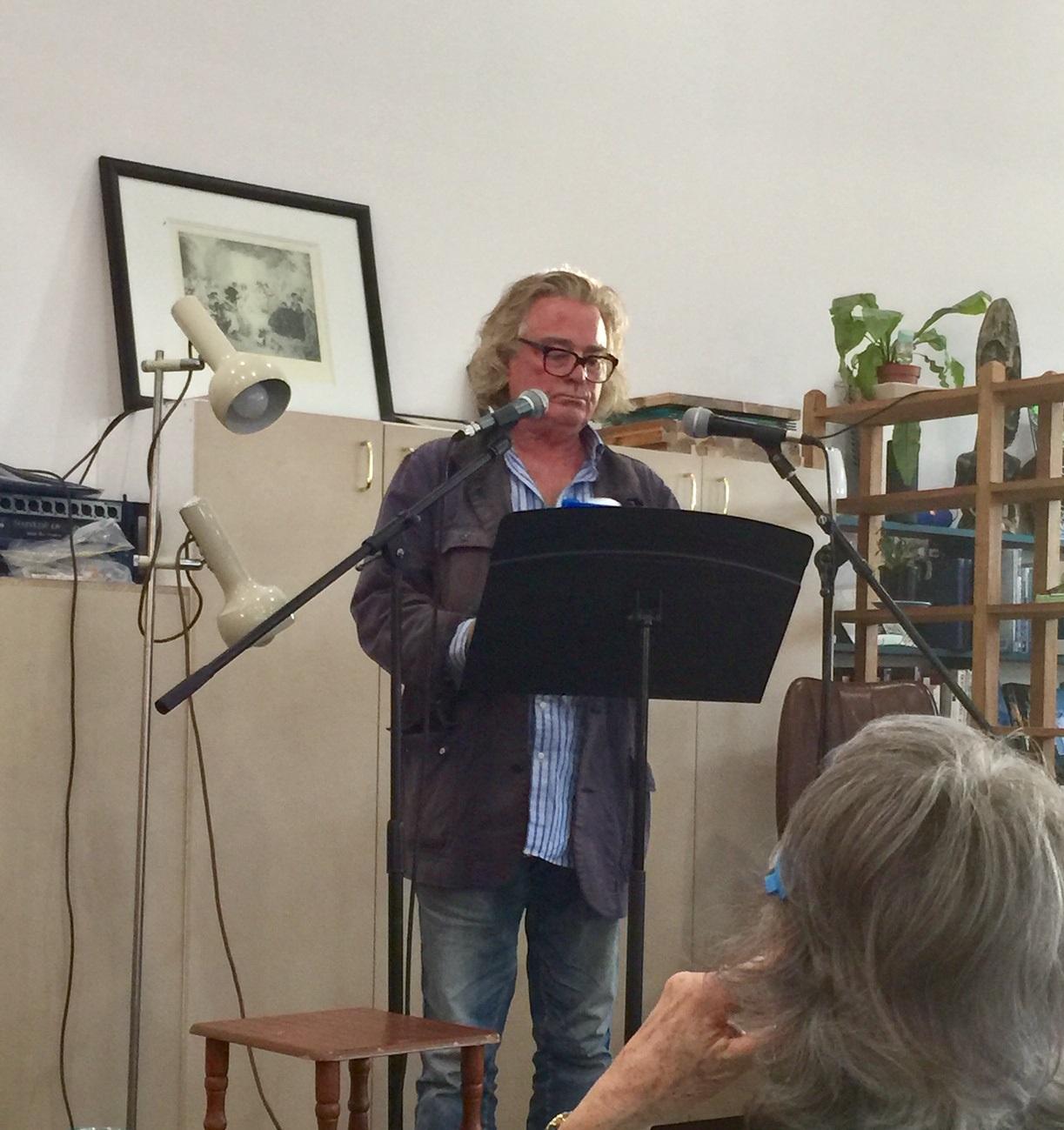
Sometime Lovett Bay resident Luke Withington is one of Australia's most beloved poets.
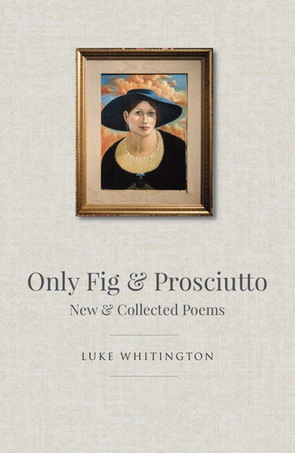 Luke is a business man and grazier with a keen interest in Art. After attending the Australian National University and working for two years in the Department of Foreign Affairs Luke and his best friend set sail on a cargo boat for Europe.
Luke is a business man and grazier with a keen interest in Art. After attending the Australian National University and working for two years in the Department of Foreign Affairs Luke and his best friend set sail on a cargo boat for Europe.
He has led a remarkable life spending nearly 20 years in Italy, including two years spent at University of Perugia learning Italian. He went into business with an Italian partner and restored 110 ancient farm houses and monasteries mainly in Umbria and some in Tuscany and he started writing more poetry which led him to Dublin where he restored the 14th Century Norman Castle Portlick situated on the shores of Lough Ree Glasson in County Westmeath.
A keen interest in Art led him to start an Arts Precinct, The Pleasants Factory, in Dublin. After 10 years he returned to Australia in 2003.
Since 2004 he has been working to improve the family cattle property Currajugg in the Southern Tablelands breeding Angus Aberdeen cattle.
In the last two decades he has concentrated his talents in the Arts writing, reading and publishing his poetry in several locations and journals including Manning Clark House Institute ACT, Quadrant Overland, The Canberra Times, Contrappaso Magazine and several Irish, Italian and Australian Poetry Anthologies.
His most recent work is “Only Fig & Proscuitto - New and Collected Poems“ published by Ginninderra Press with appraisals by Mark O’Connor and Dr Paolo Totaro AM
His Profile will run later in November, for now; dive deep into some of his poems.
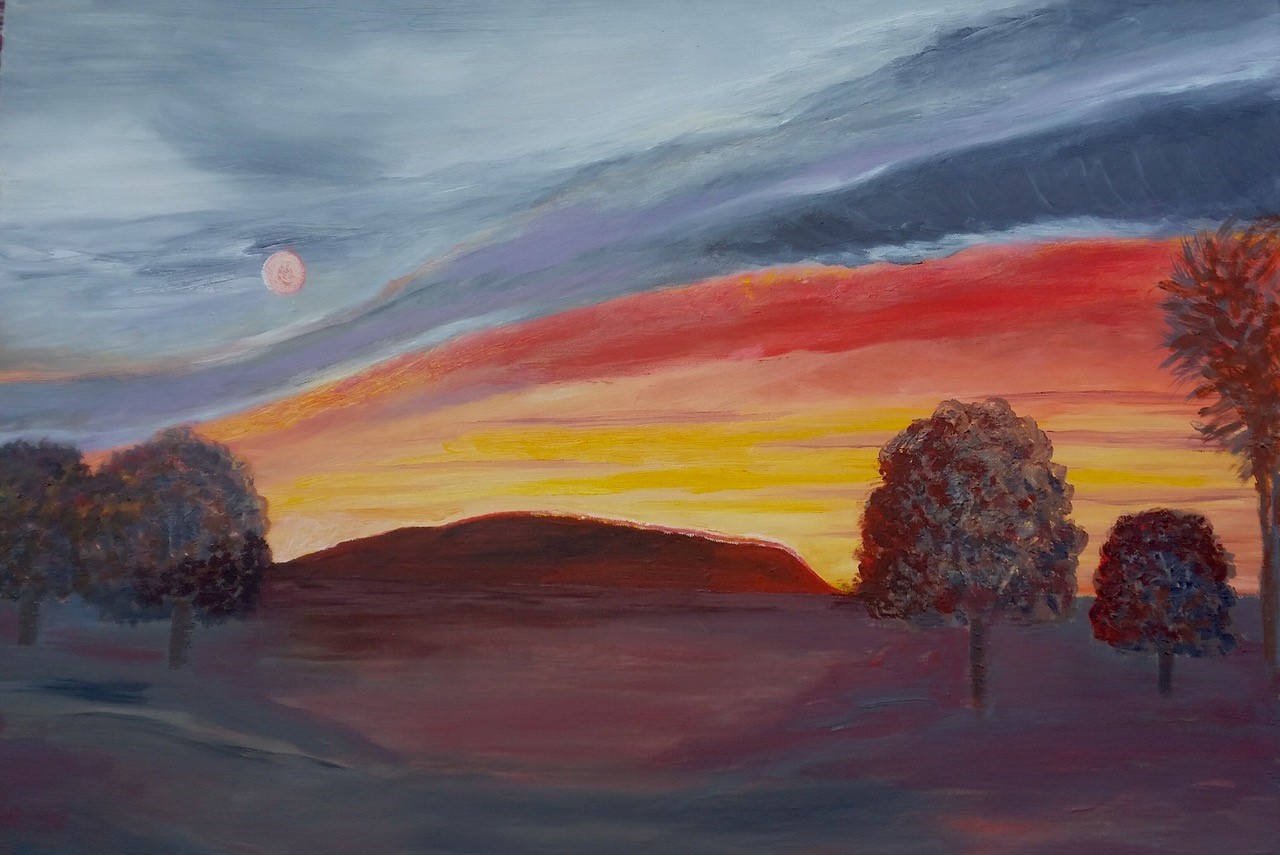
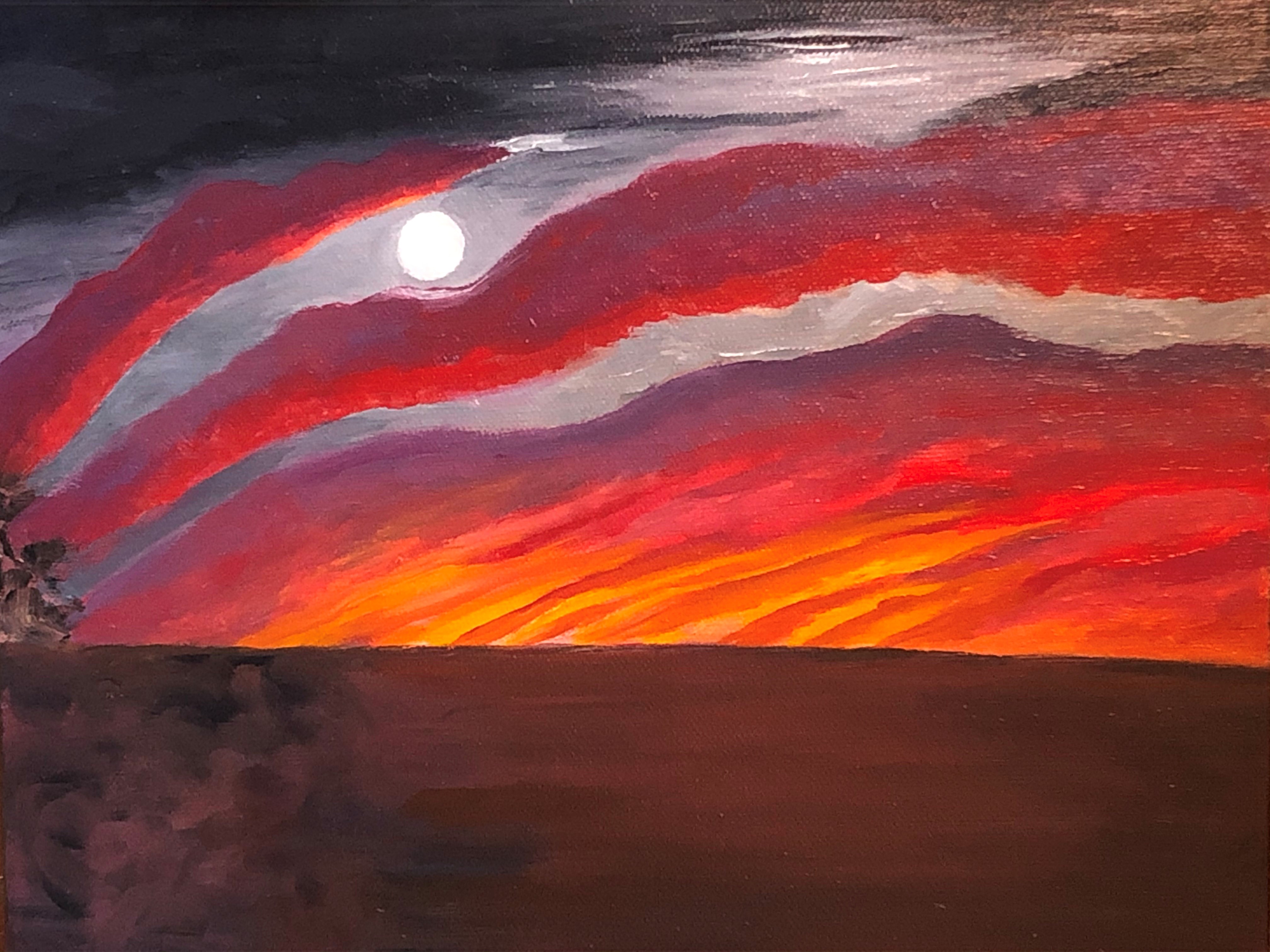
A human weathervane.
I’ve been on a horse
For days, head down into this august wind
A human weathervane, cantering across dark fields.
August is always the dying month
They say in the wind-strewn hills hereabouts.
The cows are lying down
Ready to calve, the foxes wait up
Crouched close, for the prized calf’s tongue
Hanging loose, drooling for its mother’s milk.
For the fox, an easy pate’ gained with one lunge …
I ride up and down the forest line
Scaring fox’s eyes away
Saving tongues and mothers ready to lactate
But some will not escape – despite this
A job as well done, I suppose
As any might be at four o'clock in the morning.
The tongues, apart from those in moribund dreams
May appear later, in some candle-lit place
Seasoned and salubriously served
On a glowing silver platter
With herb mustard or béchamel.
But that is a different matter
Another chapter, beyond the birthing of a calf.
Luke Whitington.
Green silence.
The silence
Of this green Tuscan hillside
Is perfect, serene
You hear your breath
Measuring it
The path taken
By the cypresses
Two files climbing together
As if they were always there
Forever paired
In the journey to the crest.
The peace, the light, the stillness
Seems eternal, even
Now with your eyes closed
The cypresses persist
Twinned, elliptical, symbols of hope.
Luke Whitington.
The moon, the tower and the manuscript.
[A salute to Giovanni Acuto – Sir John Hawkwood.]
The moon probes over snow-covered Monte Acuto
Down through ranks of mountain pines, golden light
Casts sparkles over the whiteness; filling a trace of footprints left behind.
I remember that window of scenery from John Hawkwood’s tower
like a lingering 35 millimetre negative --
Undeveloped missive from a vaguely sketched scene – and a porthole
Pointing back to myself, my persona, shuffling under the trees; not because
I was deadly poor, or because this mountain in Umbrian countryside
Was not mine at all – my perspective was formed because I was a fugitive
From family troubles left far behind - I was a stranger, lo straniero –
Out of place in that light, moving like a darker, unknown dialect
Amongst the moonlit language of the trees --
Dante was there, not as my guide.
[But somewhere in history hiding.]
I remember again as Pacific waves boom diagonals
Across these memories, and
From here everything is still pretty; the twinned peaks
Across the valley return just like perfectly formed breasts
Silly to appear so, yes, but real; true enough to an inner reality
As part of nature’s nurturing company for the years I spent there
in self-imposed exile; walking late afternoons
Along shepherds’ paths looping round the wind-blown, ragged hills --
Clambering in over fallen architraves, haphazard
Blocks of stone, to explore those villages
Abandoned as much as I was then…to stand amazed
In gaping rooms of broken windows.
The things I wrote were not all bad; part of myself was
Somewhere there swimming along with the long moments
Of those paragraphs, balancing a footing in an in between place
Where Dante, hidden, may have lived or spoken – but too young
Or over-mindful to hear or take proper note, I decided
One night -- and went straight to the pines and there in that soft glow
Of moonlight I buried my finished manuscript
Under the blameless snow. The earth resisted
Hard and cold. The spade, made over and over crisp ringing echoes; today
I am sure it is still under there; a slab of pages tucked into layers of plastic
Strong enough, I imagined, to last for years like that -- or perhaps
The plastic and pages have broken down already into useless traces;
A trickle left of a stranger’s presence, almost one million words
In flowing cellulose, saying I am here, here and lost, but not alone –
With my pen And paper, my constant friends for company –
And I saw and described as best
I could and did not try to explain or own.
The manuscript at its best
Was the story of an ephemeral home, and then
The buried footprint of a long farewell
Scratched down deep amongst the trees …
In stark moonlight I left behind whatever memories
Were penned there; clear, even possibly eloquent; but I did not come back
To find them or to write down any more again – no, no more questions
And no more replies; all that life, consigned to the faint enquiry of an Umbrian moon.
Luke Whitington.
[Footnote; Monte Acuto, not far from Perugia has enjoyed several fugitive presences over time, including rebel monks; the exiled poet Dante; and, the mercenery english soldier, Sir John Hawkwood; known as Giovanni Acuto, who built watch towers all over the Umbrian landscape.]
Expatriate.
Adrift, I think, is as good
A word as any
To describe this condition
After stepping from an aeroplane
To a train, then to a strange station
So many years ago, and not
Coming back, I circumnavigate
My original country, these homecoming days
Drifting in a dingy, so to speak, speaking
And dreaming in more
Than one tongue
Standing up unsteadily to see better
Where my old friends were, or
Might be still, amongst dots trickling along the shore --
The ones I knew in a life before
Whose quizzical gaze back into
My face today – defines little
More than the boy they once recalled
Who went away, vanished altogether on a certain day.
The streamers from railings to shore
Falling into the water
The thrust of the ship veering to point away
The faces framed, intersected by waving
Arms and hands, and what of that remains
That I left in a slow glide so far behind?
Enough to find a face again?
Enough to recognise a voice once more
Enough to step out of this little boat to say
Hey, hey, its me, I’m back! I’m here again!
For a recurring moment in time
I remember moving behind that boy’s face
Amazed, gazing, up at an architrave
A bust of a god or an ancient gable, the light serrated
By curved edges of roman tiles, a stranger
lo straniero -- in a moment of gilded silence --
Looking, absorbing, through strange, ochre-shadowed streets
Hungry always for anything more to see
Standing at beginnings and endings;
Two parts of himself, his being, his heart
Paused in the slants of a different light
The balancing of memories
Swaying together, time’s pendulum
Shifting momentum, from old to newly made.
Luke Whitington.
Bologna.
Lord I am golden from drinking
Your famous Lambrusco
I’ve stared deep into all of your Saints’
Eyes; gorgeous Cecilia, modest Mary Magdalen
Trailing threads of gold through their dresses;
The master Raphael painted, wondering blasphemously
If they were pink or golden on the other side.
Under slow golden light, under the arches
We ate tortellini, once fashioned after
The curls in a courtesans’ navel, spied through a tavern keyhole
And made by the chef, a mesmerised voyeur --
From butter, oil, eggs, flour and water ...
Now descending navels move about, creamily in my mouth
And my mind’s lascivious tongue slips over the curve of a belly
Down to a lower unbuttoning of life
I imagine I’m lying with her on the edge of the bed
Knowing the hungry eye watches, blinking lust through a keyhole.
Now some of the sweet and nutty Parma ham
Streaked with creamy ribbons of fat
Draped over split purple figs
Covering their luscious ruby insides ...
And cream spiced with truffles and Grana Padano
Slides in yellows over my tagliatelle --
I lift the strands, wrapped round my fork
As I anticipate, sniffing life’s pungent source.
My tongue swims on through voluptuous textures
As I juggle a last prayer to Mary and Altissima Cecilia
And also to our carissimo friend, Master Raphael;
Please forgive me Maestro, for my ordinary images
Of what you have already made magnificently famous...
Forgive me as well dear lord, my gastric promiscuity
Swallowing this platter of Emilian tortellini
Under your saintly alabaster gaze, under
Your patronage, under the drunken towers of our beloved Bologna.
Luke Whitington.
No moon but otherness.
No moon is quite like this
Reveals itself and then hides itself
Folds and unfolds shapes and silhouettes of itself
Quite like this -- in the shifting, star-arching sky.
No continuous light on a sea
Is quite like this, no land that waits
And bathes forever in its gleams
Is quite like this, the moon
Is not a moon, but is the state within
A vague moment turning over
In my heart that casts its calm, its hope, its single
Light, down a corridor of doubt and shadow --
That glides through the landscapes of my dreams
Contrives and steals its veils and scarves
Of light as surely as it likes; from fog and mist and wisps
Of elusiveness -- this moon is not a moon but is the sister
Of my secret life, my light unseen
Which flitters between heartbeats
And pulses, a silence ebbing slowly through me
Deep down within myself, down
Through the darknesses of my sea.
Luke Whitington.
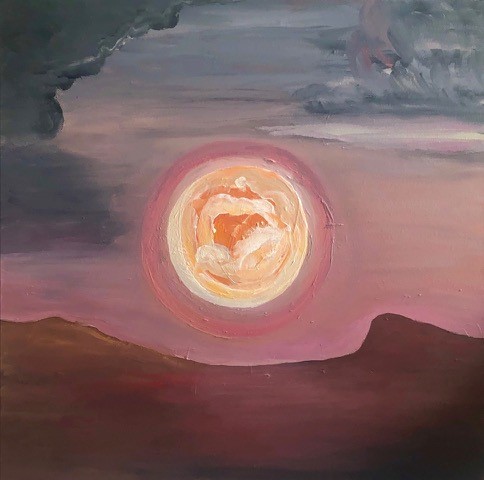
Artist: Antonia Hoddle. Title: No moon but otherness. Med: Oil / canvas. Size: H 50 X W 45 X D 5
The place of stones.
[For Harry, Pierce and Padraig
Whose caring labours saved the day.]
In Westmeath, by the shores of Lough Ree
Waves of gentle rain
Veil the ruined splendour
Of the late-medieval castle
Chiselled blocks of Port Lick stone
Clothed in rags and wisps of dozing mist
Years and years weathered while the tower
Was given free of charge to rain and rats
And rooms to fog and keening wild cats –
Silence, well brewed from time
Was the last survivor, the enduring last guest
Of dripping stone and softly dropping plaster
Like baffled breezes, destiny, upheavals, births and deaths
Disbelief, legends and otherworld stories, lingered
In the saturated air, upstairs and through the rooms
The footsteps were your very own, no other sight of life
No voice, no startled noise just a silence
As closed as stone, probably, you surmised
The dishevelled ghosts bored with haunting
And depressed, had starved to death.
Buckets in the minstrel’s gallery positioned
To catch the drops of rain had long ceased
Their tinkling plink-plonk under a roof
Denuded by winds and the burden
Of ransacking skies and streaming time --
Above the rumpled cupola of remaining roof
The rest a colander for light and gloom --
Downstairs the doors slammed
Opened and closed without locks
Perhaps the ghosts have chosen
To sway amongst their movement
The clapping of the doors a rhythm
A beat of time, for an unseen dance applauded.
To all of this you, the adventurer, arrived one day
Clouds galloping over the lake
The abandoned hedges shivering
In the wind – the Japanese cedars
And copper beeches trailing
Expensive tatters of russet and green
In the relentless wind -- and you bearer of the only key
Opened the splintered door below the stone portico
And all the doors set up in a chorus
And when you stepped inside
As air rushed up and through
Every room and hallway
You shivered as the building breathed at last
And the doors clapped wild applause at this awakening.
There was one ghost still waiting
The blue lady who peered over
And suddenly vanished into walls
As the intrepid invader stepped up the staircase --
Gone to who knows where, wearing
Her long blue veil and carrying her little suitcase.
You the chilled invader wished her well and hoped she
Made her way safely along, through stone and mortar to her next journey
For she had harmed no one and had peacefully
Abandoned her role as guardian of this artfully crafted ruin.
And so you as the last new owner began to reconstruct
With sparks and carpenter and plumber
To put her weathered splendour back together
And gradually from top to bottom
With hammer, nail, saw and screw
With taps and valves and lengths of tube
Hands and minds that worked to lift and tighten
Her demise and yawning gravity
Was checked for at least another century.
Now her tower outsoars the doves and ravens
Above the green and grey trickling mists that visit
Through the oaks, cedars and beeches
Her tamed lawns reach as far as grain-sown paddocks
There shadows in the yellows graze, skirmish and retreat
Perhaps the ghosts have found another breeze-blown home.
The skies with their cavalries of clouds
Veer past and across the lake and from the battlements
Five seasons in one day can often invade the trees
And make the ivy on trunks and walls flutter and breathe
The breezes below blurring the colours of shrubs, trees
Flowers and a rubble-path of resurfaced stone.
And in my final goodbye
I the invader leave
Her righted, standing
As guardian of her time
And she stands also as testimony
Of an Irish idyll
The days when youth and foolishness
Still prevailed, over dour, common sense.
Luke Whitington.
The rock pool.
Crouched down in the grass
You loved the way
The wind blew past
Too high to find you.
Or down by your favourite pool
In the creek where you waited --
Getting later for dinner, under
The arched branch of a reddening sky
The tadpoles forever, forever quivering --
Trembling to one place -- until your father’s urgent cry
Calling for you to hurry and come
And eat your dinner with mum
And him --facing the panes of the kitchen window
while you forked down steak, watching the way
The gum trees would shake in the wind, fascinated
By the way the crisp, swishing leaves
Tossed clumps of silver, back and forward again…
The keening cry of the crows, forging
Through red realms of sky, streaks of veering clouds
Left in long thumb-strokes; the calm following the vanished wind.
Today you have grown but the feathered redness
Of a sunset is still clear evidence
Of those times, and you can still sense
Your old self back there; like a leaf or a curved blade of grass
Lying, tumbled into wilderness -- but the witnesses
Of your childhood life; of your treks to the creek and back
Have gone, skies of swallows drifted to somewhere else…
The proof of them continues to weather
In paired names, lichened into stone and their images
Sometimes seen in the vast quiet of clouds
Or floating half written in the wind, speared by cries of crows
And just over the rise, a congress of clouds
Still speaking memory, drifting higher into Clyde mountains.
Luke Whitington.
The swallows in Saint Peters Square.
The swallows refuse to assist
My eye’s dismissal, tip toeing in the air
Like those minnows, suspended in a stream
Of the moment, they hover then let go
And wheeling descend to slowly rise again, no flying monk
Could pull and allow his bells to topple
Roll over so eloquently, as these unconscious ballerinas of the air.
The priests that flow in pairs from St Peters sway out across the square
And hardly lift their heads toward these tiny pendulums of flight
They grip their rosaries against the risk of an uncertain sky
And turn down the avenue in files; fluttering rags of darkness toward approaching night.
And as always I delay in this apricot-smudged square of Rome
And love to watch this autumnal show, the departure of the swallows
Signalled by their silent play, my eyes a little saddened
Want their farewell to be over quickly, my mind tucking away their salutations
But my heart tugs against this dismissal, hypnotized
By this continual swinging rhythm, a serenade to autumn
A flock of birds’ last ballet in the changing rusts of light
Through a radiant gateway; time threaded for the traveller’s eyes.
Luke Whitington.
Shapes of quietness.
[For Trisha Dixon.]
She called and said -- come
And see my country – so I did, I drove
Through high forests
On the back roads
Then down; a long glide descending
Into her plains, her loping grey
Formations of land; treeless, naked
Brooding landscape
Sensual looping, pooling shapes of silence –
On a crest I stopped; sat in the idling
Car and watched the sunset;
The flood of yellow; a sea of fading fire --
And then I drove on down, to find
On a curve, her unnamed gate --
I had come to find a woman’s laughter
Sunlit chuckling waters
In her voice – yet I found two –
Instead of one – Monaro
In her shapely quiet
Had gifted me, two dusk-lit smiles.
Luke Whitington.
Still, not yet forever.
The clouds wait
As if in a painting
The sun has risen, paused
Behind a veil of whiteness.
Sky and wide, arching dome of silence --
The painting waits to begin
A mist of shadow low down
Covers the land, suspended
For a signal, is this the first or last moment?
Or is it memory waylaid
Or about to turn now, going back
To where it thought it was before?
Or is this in the subconscious?
An image or a prophecy of an ending
Autumn, shadows, a litter of loss –
Shadows reaching for
Dark freedoms –the horizon dreaming
Of once upon a time;
Of early light, just for one moment
Still, not yet forever.
Luke Whitington.
Answers in midday pastures.
Small things triggering, tripping up memory
An artist mutters over a brushstroke, a writer
Breaks a pencil’s tip, an unfinished page flies away
A fumbled phrase is lifted out of a mind –
Words gliding away under sunlight –
Depicted ochres spilling out into yellows
Who else is there
In the middle of creation --
In a person’s confusion, notions of beauty –
Who is there still left to talk to?
Will memory, anything, confess?
Are there any buried questions? –
The field at the end of the path
Will not unlatch its pristine gate --
The sea of grass, windswept at noon, holds no explanation
Today -- only blades flowing with drifting green silence
And lazing sunlight, time grazing aloft in time.
The sky is misleading with its gusting possibilities
And the clouds will not reveal even a caption
Lounging, billowing, rotund shirkers
Hoarding bulges of the unsaid, the unread --
Better return to the old talk in your head
Getting back to the original plan
An echoing inner conversation while
Searching, ruminating, down the afternoon path
Down the years of instinctive conjecture
Ideas shuffled and dealt out like cards of options
Passing through the landscape of huddled
Shrubbed questions and answers –all the shadows insatiable
Their shapes elongated, sprawling with impenetrable silence.
Luke Whitington.
A fresh page.
A chair we know well
Waits in a kitchen
Which has witnessed thought.
Simple things put away
Sleep or delay in well-used drawers.
The new poem waits, framed, still invisible
Within a white page on the table
With the pen beside, ready there
Until the morning breaks. Light dawning
Behind the mountain
Comes to suggest colours, shapes
Echoes and shards -- of brightness
Of living, recalled in a room that has learnt
The sound of an oaring chair; shifting its way
Along with thoughts, with a wake of elongations
Ripples of ink, with rhyme drying in arabesques, sometimes italics.
The author is far out to sea now
Sitting in a dinghy, sailing the moonlit
World of dreams, drifting further
While a future discovery waits to surface on the table
News of living, unlike the usual news
Remains fresh, pungent for the taking --
News that cannot, or will not, always explain.
The poem is a pause in longing
For moments to come
Like the coming rain
Coming, then not coming at all
The poem, alone, is a kind of longing
To be close beside
The absent lover
Or even beside the imagined lover
Longing even to be far away, gone a long way –
We despair for rain
Again and again –it does not come
Perhaps the lover is the rain
Waiting, cogitating, in lines to come
Each line inconceivable, a leap
In the dark, as capricious
As love can be, and is sadly sometimes not –
Hints and signs sensed in the wind
Sounds heard in the dreams of drifting
Something has changed, as always
Nothing is ever the same
The boat slows beneath celestial silence
Oars trailing in the water
A page, moonlit, empty on the table
Waits, again, for a wave
For a slap from the sea on the shore
For news of rain or love or pain
For news of words – some to come and rain again.
Luke Whitington.
Southbound.
My mother would begin
To pack up and
We knew we were on the move
Father driving, listening
Hourly to the news
The ABC a beacon
As we glided on through time
My mother feeding
Us Cadburys milk chocolate
Content to watch the road
The concrete and the horizon
Widening always towards us
The bonnet swallowing time
As we drove the hours required
Our parents on a mission
We, behind, enjoying
The lark of another expedition
We had our own
Private jokes, we whispered them
Behind their stationary heads
Sometimes we would wrestle
Giggling or silent
To grapple with the boredom
But mostly we enjoyed
The spectacle of all worlds passing
The silences of the landscapes, closely coming, going
The sense of encapsulated
Movement, the hidden pact we had with time.
Today I drive on my own by satellite
Down the same silence of highway
The others have gone
To heaven, or estrangement
The same cantering hills
The same curve of dried lake
The same steep climb
Through scrub and stunted eucalyptus
The sudden rise, swooping toward
The storm’s horizon, the silence
Under the rippled belly of the sky
And coasting down
At last the last descent
An avenue of dancing trees
Until I regain “my destination.”
The end and the beginning
Of where I go to get to where I am.
Luke Whitington.